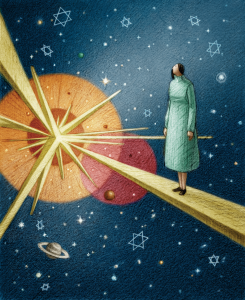Being Jewish
Commentary
Commentary: Jews and God

Years ago, I read After Auschwitz: History, Theology, and Contemporary Judaism, Richard Rubenstein’s painful little book published in 1966. It argues that the covenant between God and the Jews had been cancelled by the Holocaust. I had already done a great deal of reading—history
and eyewitness testimony—in preparation for my novel Touching Evil (1969), about American Jews who learned of the Holocaust through the Eichmann Trial and survivors’ testimony televised from Israel to the United States. By that time, I had myself become a Holocaust rebel-against-God.
Three recent events, only one clearly Jewish, all seem to connect to that time. The first signals loss of a different kind, announcing that Creation can happen without God. The Large Hadron Collider, the biggest ever constructed, has finally smashed together two protons to unleash a Higgs boson—the so-called “God particle”—in a manner that replicates Creation’s Big Bang eons ago. (Please don’t ask me how; science has long used the phrase “Big Bang” to refer to Creation’s suddenness; the collider called it up by science alone, without God.)
The particle accelerator produced a particle with mass, necessary for the beginning of life. So, not only must human beings endure a universe that provokes complaint, but, also, according to the latest scientific findings, there is no one to complain to!
The second event: The tiny book group to which I belong read Stephen Greenblatt’s new The Swerve: How the World Became Modern (W.W. Norton) together with a nearly 3,000-year-old poem, “The Way Things Are,” by Lucretius. I learned from my academic fellow book club members that Lucretius was a Roman emperor. He valued the teachings of the Greek philosopher Epicurus, who taught that God and the afterlife did not exist—the soul dies with the body. Facing death without hope of reward from the gods must have seemed ennobling to Lucretius, the Roman soldier-emperor. As for Greenblatt, a renowned Shakespeare scholar and a Jew, he claims he found in Lucretius’s denial of the gods’ power an antidote for his mother’s obsession with death.
Epicurus’s philosophy encourages us to enjoy the life we have while we have it (there is no other). Those views traveled a long way and became, astonishingly, a canonical part of the Hebrew Bible (Ecclesiastes), with its refrain: “All is vanity.”
The third event: I became a member of a synagogue. I had been going off and on for years to various shuls—for the Yizkor prayer of remembrance for the dead, or to hear a cantor sing the shatteringly beautiful Hallel, or to share a part of some holiday. This time I paid my dues, feeling like a grownup.
But what was I joining for? Lucretius and the Large Hadron Collider hinted strongly that God would not be found in shul. Nor could I send messages to the dead in services.
Yet the suggestion of Ecclesiastes (3:1) is that life is ordered as if God were overseeing it: There is “a time for every purpose under heaven.” Can that mean there is a time when young, hip postdenominational Jews as well as heartsick post-Holocaust ones can search for God together? A time to mix belief and nonbelief, even inside one person?
Between the old After Auschwitz and the new Godless Creation of the “God particle” stands an old, sober Jewish joke. It is about two Polish yeshiva students who meet again after the Shoah. One of them has lost his faith and argues for atheism. Suddenly, he breaks off and starts to walk away. “Where are you going?” the other demands. “Look at the time,” the atheist answers, “a Jew has to pray.”
That makes me wonder: Do reason and faith not oppose but coexist in one’s self? What are arguments when it comes to Jews and God?










 Facebook
Facebook Instagram
Instagram Twitter
Twitter
Leave a Reply